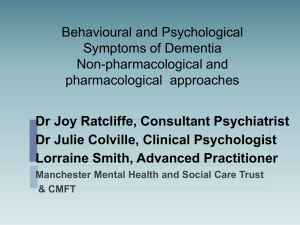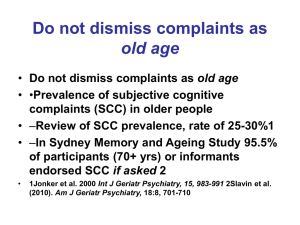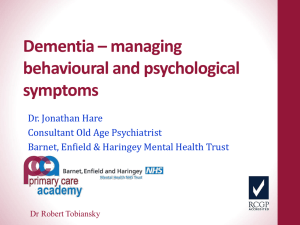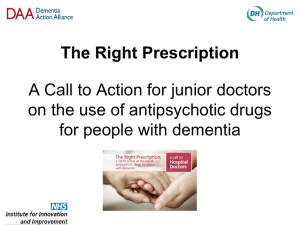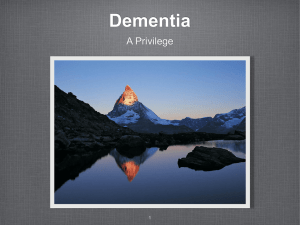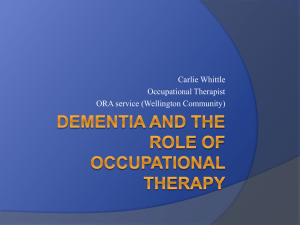Advanced Dementia Care - the Psychiatrists perspective
advertisement
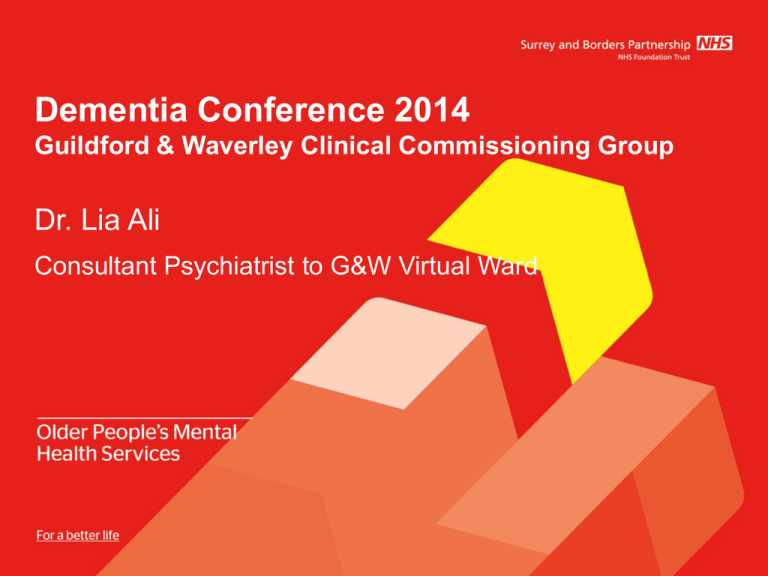
Dementia Conference 2014 Guildford & Waverley Clinical Commissioning Group Dr. Lia Ali Consultant Psychiatrist to G&W Virtual Ward What do people with advanced dementia live with? Behavioural & Psychiatric Symptoms (BPSD) Psychosis • Hallucinations • Delusions • Misidentification Aggression • Physical aggression • Verbal Aggression • Aggressive resistance to care Depression • Sad • Tearful • Hopeless • Guilty • Anxiety Apathy • Withdrawn • Lack of interest • Amotivation Agitation/Motor • Wandering • Restlessness • Sleep disturbance • Repetitive actions • Screaming Differing dementias Alzheimer’s disease Apathy, agitation, irritability, anxiety, depression, (delusions & hallucinations are less common) Vascular dementia Apathy, depression, delusions, emotional lability Dementia with Lewy bodies & Dementia in Parkinson’s disease Visual hallucinations, delusions, depression, sleep disturbance (REM sleep-behaviour disorder) McKeith & Cummings 2005 Corticobasal degeneration Depression Progressive supranuclear palsy Apathy, disinhibition Causes of BPSD Cognitive factors Psychological factors Social factors Biological factors Physical factors - Neuroanatomy - Neurochemistry - Genetics Causes of BPSD Cognitive factors Psychological factors Social factors Biological factors Physical factors - Amnesia - Agnosia - Apraxia - Aphasia - Visuoperceptual - Executive function Causes of BPSD Cognitive factors Psychological factors Social factors Biological factors Physical factors - Illness - Delirium - Pain - Medication - Fatigue - Constipation - Basic needs (dietary, toiletry) Causes of BPSD Cognitive factors Psychological factors Social factors - Social network - Family relationshipsSocial interactions (caregivers, residents) Biological factors Physical factors Causes of BPSD Cognitive factors - Premorbid personality - Previous mental health - Previous trauma/losses - Adjustment - Lifelong coping strategies Psychological factors Social factors Biological factors Physical factors Causes of BPSD Cognitive factors Biological Psychological factorsEnvironmentfactors Social factors Physical factors BPSD: persistent throughout disease course • Prevalence of BPSD varies at different stages of the disease process Lovheim et al., (2008) Cognition •Depression •Anxiety •Psychosis Later: Severity Earlier: •Agitation Behavioural disturbance Time •Wandering •Apathy ABC chart ABC Chart for Mr X Please record ALL incidents of aggressive or inappropriate behaviour as this will help us to devise the most effective strategies for managing his behaviour. Antecedents Behaviour Consequences Antecedents consist of both the setting conditions (which increase the likelihood of a behaviour occurring) and the immediate triggers to the behaviour. Setting conditions How was the person feeling before the behaviour? e.g. feeling low in mood, tired, ill, in pain, bored, etc. Triggers What was happening before the incident? e.g. he was being washed, being asked to transfer out of bed, being asked what he wanted for lunch, pad was being changed, he was being asked something, etc. Where did it happen? e.g. in the person’s room, in the community, etc. Who was involved? Give as full a description as possible of what the person was doing, including physical aspects (e.g. hitting, throwing, being sexually disinhibited) and verbal aspects (e.g. shouting, swearing). Record what the person actually said. How long did the behaviour last for? How severe or intense was the behaviour? What happened as a result of the behaviour? What did you do to try and manage the behaviour? How well did that work? What was the behaviour of the person like after the incident? Mr X became angry, shouted that he wanted us to go, swore at us and then threw a cloth at us. He remained agitated for 10 minutes. We stopped the activity and gave Mr X time to calm down. We then explained why we needed to wash him. We explained that he should tell us when the pain was too much for him and we would stop for a break. He calmed down and agreed to be washed. We explained what we would be doing at each step and checked his pain levels during it, stopping for a break when it was too much. SETTING CONDITIONS TRIGGERS Mr X reported that he had been feeling tired as he hadn’t slept well last night due to pain, and was continuing to experience pain. Mr X was being washed and having his pad changed in his bedroom by myself and another HCA, Jon. Management – other non-pharmacological Treat the underlying cause Aromatherapy (Ballard, lemon balm) Multisensory stimulation Therapeutic use of music and/or dancing Animal-assisted therapy Massage Signage The evidence suggests for Agitation in AD If you have to prescribe a drug…. Risperidone 0.5mg bd for 6/52 Less evidence for alternative antipsychotics Quetiapine – evidence of non-efficacy Cholinesterase inhibitors and memantine – not effective acutely or in prophylaxis So in conclusion – courtesy of Prof Howard What to do Cholinesterase inhibitors and, to a lesser extent, memantine offer modest symptomatic benefits for cognitive symptoms at all stages Try to avoid drug treatments for behavioural symptoms and only use the licensed agent What not to do Don’t raise unrealistic expectations about the impact of symptomatic cognitive treatment Benzodiazepines generally make people with dementia worse The fewer psychotropics the better Want to know more? IMPARTS Course Mental health skills for non-mental health professionals distressed patients; confusion/dementia; substance misuse; medically unexplained symptoms; managing conflict. 29/01/2014 and 26/02/2014 with additional e-learning Lia.ali@kcl.ac.uk MSc in Advanced Care in Dementia mscacid@kcl.ac.uk

